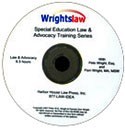|
|
|
We get email from parents who want to make sure their kids get the help they need when transitioning to college, community college, or vocational and career programs.
Many don't realize that IDEA does not follow the child into post-secondary programs.
Others don't realize that colleges generally require a current evaluation before they will provide accommodations for students or waive course requirements.
Often, neither parent nor child realize it's time for a shift in responsibility - students need to learn how to be effective advocates for themselves.
In this issue of the Special Ed Advocate learn more about the rights to protections under Section 504 and ADA and the responsibilities of self-advocacy. You'll find information and encouragement to help you navigate transition challenges after high school.
Don't hesitate to forward this issue to other families, friends, and colleagues.

Sign up free today! l Read previous issues |
|
| Life after High School: AKA " Flying the Nest" |
"Does the community college have to accept the senior's IEP?"
"Does the IEP follow the student, or does the college reassess the student and write a new IEP?"
Many parents don't realize that IDEA does not follow their child into college. Post-secondary schools have no obligation to create a document like the IEP and there is no protection under IDEA.
Section 504 of the Rehabilitation Act and Title II of the Americans with Disabilities Act do provide protections for students with disabilities.
Find out more about Key Differences Between Section 504 and IDEA, from Indiana Advocate Pat Howey.
Section 504 Follows the Child, IDEA Does Not
When your child graduates from high school with a regular diploma or reaches the age of 22, his entitlement to rights under IDEA ends. IDEA rights do not follow the student into college or the workplace.
You need to make sure you and your child know what to expect.
Read Know Your Rights and Responsibilities and the Letter to Parents from the US Department of Education, Office of Civil Rights. |
back to the top |
|
| Self Advocacy: Know Yourself, Know What You Need, Know How to Get It |
We've told you that IEPs end after high school. So do the rights of parents under Section 504 and IDEA. Students need to advocate for themselves after public school.
"Self-advocacy is the ability to understand and communicate one's needs to other individuals. Learning to become an effective self-advocate is all about educating the people around you. There are three steps to becoming an effective self-advocate...
Read about these three steps and find more great tips in Self-Advocacy: Know Yourself, Know What You Need, Know How to Get It by Nancy James.
Find Your Own Voice
Students who know how to present information about their disability and seek the accommodations they need are more likely to make a successful transition to life after high school.
Go to the Wrightslaw Self-Advocacy page for information about self-advocacy
- skills
- tips
- guides
- resources.
For students transitioning to college, vocational training, employment, or independent living, don't miss this information about learning self-advocacy skills. |
back to the top |
|
| Do Colleges HAVE to Provide Accommodations for Students with Disabilities? |
Unlike high schools, which are required to identify students with disabilities and accommodate them, colleges are required only to have the services available. It's up to the student to make the institution aware of his or her disability and ask for an accommodation.
Why disclose your disability? One reason is that your disability has influenced your approach to learning, your determination, and many other things in your life.
Dr. Mike Brown, East Carolina University, says "Many universities are now getting the message about Section 504 ..." To better your chances of getting waivers of requirements from colleges, read his article Accommodations for College Students. |
back to the top |
|
| Success Stories: Embracing Self-Sufficiency |
The number of students with disabilities in post-secondary educational institutions is swelling. Students with disabilities across the country are getting an extra hand in transition to college and other continuing education programs.
Spend some time at College: Continuing and Higher Education. You'll find comprehensive information, articles, and resources you need when planning and preparing for a successful transition.
You won't want to miss "Embracing Self-Sufficiency" and other success stories about how university disability services are supporting and encouraging students to be their own best advocates. |
back to the top |
|
|






